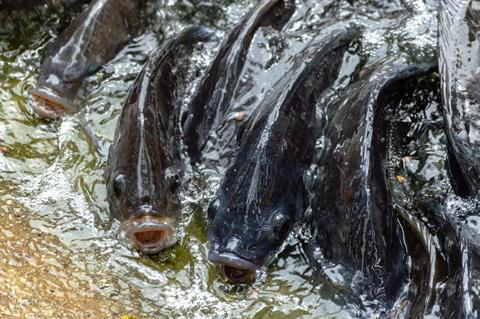Aquatic farms could serve as a potential reservoir of colistin and carbapenem resistance, a new study warns.
The review, by researchers at the University of Manchester, ‘An Update on the Prevalence of Colistin and Carbapenem-Resistant Gram-Negative Bacteria in Aquaculture: an Emerging Threat to Public Health’, has been accepted by the Journal of Applied Microbiology, an Applied Microbiology International publication.

“Readers will be aware that antimicrobial resistance (AMR) is one of the greatest challenges to global health today. Aquaculture, the farming of aquatic animals, is one of the fastest-growing animal food industries, providing food for millions of people and employment for many,” said corresponding author Professor Andrew McBain.
Global production
Aquaculture currently represents up to 50% of total fishery production globally, and this trend is predicted to continue through 2030.
“The expansion of aquaculture has been fueled by the exponential growth in human populations, as well as the depletion of wild fisheries. Some of the practices accompanying the industrial expansion of aquaculture have the potential to be harmful to human and animal health,” the authors warned.
“Like other animal production sectors, aquatic farms use intensive and semi-intensive practices, resulting in higher animal concentrations within small water spaces, hence raising the danger of infections and resulting in large-scale stock losses.
“As a result, antibiotics are presently used as preventive and therapeutic measures to control disease outbreaks. Extensive application of antimicrobials in aquatic farms, in turn, may accelerate selective pressures towards AMR.”
High incidence
The team carried out a review of studies that investigate the incidence of colistin and carbapenem resistance (CCR) in aquaculture.
They found that overall a high incidence of CCR has been reported in aquatic farms in several countries, with CCR being more prevalent among opportunistic human pathogens such as Acinetobacter nosocomialis, Shewanella algae, Photobacterium damselae, Vibrio spp., Aeromonas spp., as well as members of the Enterobacteriaceae family.
“The findings from these studies demonstrate that aquatic farms may constitute a potential reservoir of CCR,” the authors said.
“Carbapenem and colistin are considered two of the most critical antimicrobial agents used in clinical settings, and they remain the last resort drugs for the treatment of serious infections resulting from Gram-negative bacteria.
Potential reservoir
“The findings from the literature demonstrate that aquatic farms may constitute a potential reservoir of CCR. This emphasises the need for establishing effective management and control measures that regulate the usage of antimicrobials in aquaculture, as well as adapting continuous monitoring and surveillance programmes that combat AMR to reduce the spread of resistant bacteria originating in aquaculture and avoid their global reach.”
To build on these findings, Professor McBain recommended:
-
Raising the levels of awareness among stakeholders (consumers, workers, government regulators, veterinarians, fish farmers, physicians, and national international organisations, which foster aquaculture operations) about the detrimental effects of excessive antimicrobial use on the health of the aquatic ecosystem, fish, and human beings.
-
Reduction of the use of antimicrobial agents, prohibiting their usage for purposes of promoting growth and prophylaxis and improving the health of fish and shellfish in aquatic farms by implementing safer therapeutic and prophylactic alternatives, such as vaccines, probiotics, and bacteriophages.
-
Incorporation of the aquaculture sector into standard surveillance programs. In June 2019, the European Food Safety Authority (EFSA) advised that antimicrobial resistance surveillance be extended to seafood products and aquaculture.
The work was done as part of the split-site PhD studentship of Roa Memesh, who is based at King Abdulaziz University in Jeddah, Saudi Arabia.
Her local supervisors are Muhammad Yasir and Esam Azhar. Her supervisory team at the University of Manchester are Ruth Ledder and Andrew McBain.
‘An Update on the Prevalence of Colistin and Carbapenem-Resistant Gram-Negative Bacteria in Aquaculture: an Emerging Threat to Public Health’, has been accepted by the Journal of Applied Microbiology, an Applied MIcrobiology International publication.
Topics
- Acinetobacter nosocomialis
- Aeromonas
- Andrew McBain
- Antimicrobial Resistance
- Applied Microbiology International
- Aquaculture
- carbapenem
- colistin
- Community
- Enterobacteriaceae
- Esam Azhar
- European Food Safety Authority
- Food Security
- King Abdulaziz University
- Muhammad Yasir
- One Health
- Photobacterium damselae
- Research News
- Roa Memesh
- Ruth Ledder
- Shewanella algae
- UK & Rest of Europe
- University of Manchester
- vibrio







No comments yet